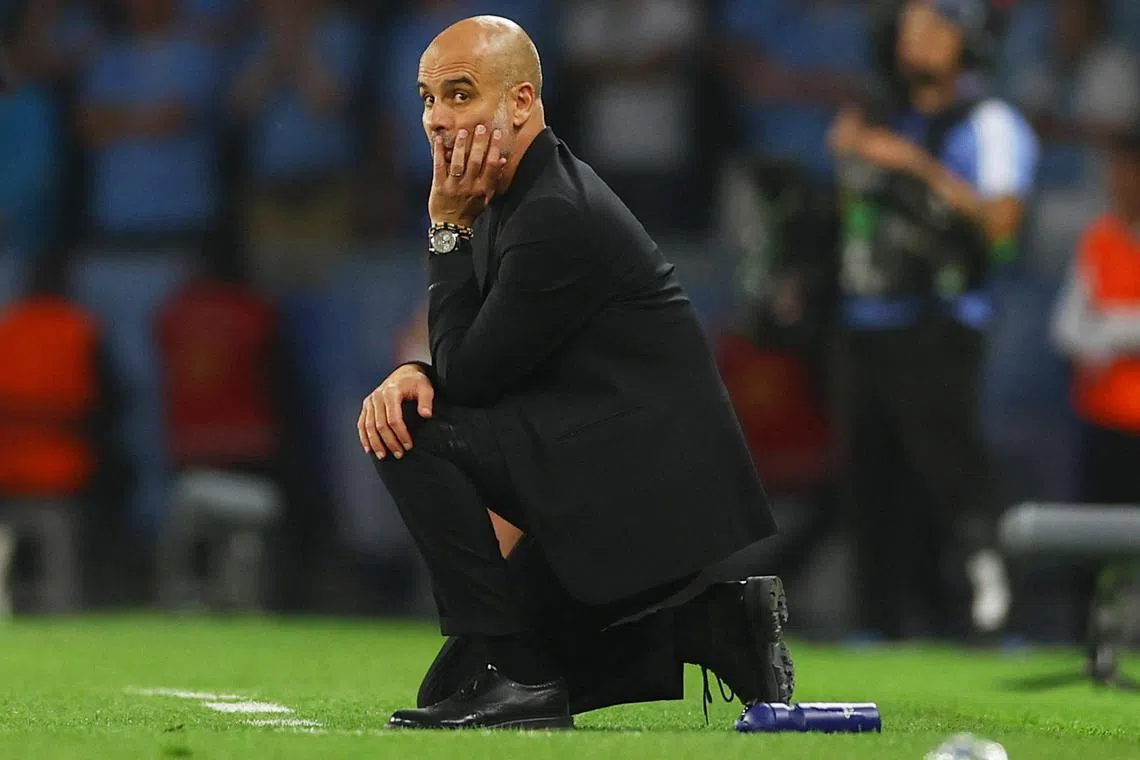Pep Guardiola treble and Luis Enrique appointment highlight Spanish coaching impact
Sign up now: Get the biggest sports news in your inbox

Spanish managers are highly rated, with Manchester City's treble-winner Pep Guardiola a leading light.
PHOTO: REUTERS
BARCELONA – In the wake of Pep Guardiola’s stunning treble with Manchester City and Paris Saint-Germain turning to Luis Enrique, it is clear Spanish coaching is in vogue.
The duo, both treble winners at Barcelona, are joined by plenty of compatriots at other top-flight sides on the continent.
Arsenal’s Mikel Arteta, Guardiola’s former assistant, ran City close for the English title last season.
With a different approach to the game, Unai Emery has pulled up trees with Aston Villa, Bournemouth sprang for Andoni Iraola, while Julen Lopetegui helped Wolverhampton Wanderers avoid the drop and Marseille appointed Marcelino Garcia Toral in June.
Spanish coaches have been increasingly appealing since the country dominated world football from 2008 to 2012, La Roja winning the European Championship in those years, as well as the 2010 World Cup.
Nations League victory in June, under Luis de la Fuente, who replaced Enrique in December,
With Spain’s football so dominant – at club level La Liga teams have won 11 of the last 24 Champions Leagues and 12 of the last 20 Europa Leagues – overseas clubs watched with covetous eyes.
That interest leads to a “brain drain” effect, but the Spanish FA’s coaching school quickly produces replacements.
“We are the reflection in the federation of how they work at the clubs and in the youth academies,” said Spain Under-21 coach Santi Denia, after leading his team into the Euro 2023 final.
“The level of Spanish coaches is the best in the world, and I’m not saying that about myself, obviously. I try to take advantage of the work of the Spanish coaches.”
La Liga has 17 Spanish coaches among its 20 sides, as well as four operating in England, three in France including Enrique, and one in Germany. Almost 27 per cent of teams across Europe’s top five leagues have a Spaniard at the helm, as of July 2023.
Without the spending power of other leagues – outside of Spain’s Big Three of Barcelona, Real Madrid and Atletico Madrid – many clubs focus on coaching players rather than buying new ones.
Instead of the power, speed and frantic nature English football is known for, Spainish teams have often looked to hone some of the more technical and tactical aspects of the game.
Even though elsewhere teams defend with more brawn, backlines in Spain are often tougher to break down because they control spaces superbly.
While the tiki-taka style in its purest form has faded, with even Guardiola moving on, the key elements of it still propel City’s game.
Combining that level of technique and positional play with the physicality and velocity the Premier League is known for has found the apex of the two styles.
Guardiola’s treble-winning team have an imposing spine, from Erling Haaland to Rodri to regularly lining up with four central defenders, but still dominating.
That union of styles is reflected in Enrique, a forceful player and manager, but an advocate of possession football while in charge of Spain.
Perhaps it also explains how so many coaches have come from one province of Spain’s Basque country – Guipuzcoa. Iraola, Emery, Lopetegui and Arteta all hail from there, along with Real Sociedad coach Imanol Alguacil and Bayer Leverkusen’s Xabi Alonso.
The weather in that region is closer to England’s than the scorching south and the teams historically played in a more physical style than their La Liga counterparts.
“I don’t think it’s coincidence, we must have some common thread,” Arteta told Marca in June.
“I don’t know if it’s the Basque character connecting well with the English, our style, our way of being, or our seriousness.”
Regardless of whether Spanish coaches lean towards attacking or defensive styles, they are tactically rigorous.
One outlier is Jose Luis Mendilibar, who led Sevilla to Europa League glory last season with a back-to-basics approach – at least that is how he describes it.
As well as the appeal of Spanish coaches to foreign sides, the attraction is mutual, not least because many coaches can earn more abroad than in Spain.
La Liga teams have been tightening their purse strings for years, while Premier League spending continues to rise.
That means coaches can have access to a higher calibre of player than back home and have more requests met in the transfer market.
Spanish is also the second language spoken in many Premier League dressing rooms featuring South American players – including Portuguese-speaking Brazilians, who are often comfortable with it.
Rafael Benitez was the first Spaniard to coach in the English top flight, leading Liverpool to Champions League glory in 2005 – and even he was criticised for his zonal marking defensive set-up.
Since then, Spanish coaching influence in the Premier League and other top divisions has steadily risen, and Enrique’s arrival in Paris is the latest example. AFP


